Knowing how to negotiate job offer benefits can significantly improve your overall compensation. Beyond salary, benefits like flexible schedules or better insurance contribute to your lifestyle and financial well-being. Knowing the most valuable benefits to ask for in a job can help you maximize your total compensation package.
So, let’s break down how to approach negotiating benefits in a job offer, how to prepare, what to ask for, and how to negotiate like a professional.
Key takeaways
- Benefits can make up 30–40% of total compensation; don’t negotiate salary alone.
- Prepare well: research benchmarks, know your market rate/negotiation range, and choose your top 2–3 asks.
- Prioritize high-impact perks: PTO, flexible/remote work, signing bonus, health coverage, retirement match.
- Negotiate after you have the written offer, be specific and data-backed, and frame asks as mutual wins.
- Always confirm outcomes in writing and keep trade-offs ready (e.g., bonus if salary is fixed).
1. Why negotiating job offer benefits matters more than you think
Most professionals focus on base salary. But in reality, benefits often represent 30 to 40 percent of total compensation, according to data from the U.S. Bureau of Labor Statistics (June 2026).
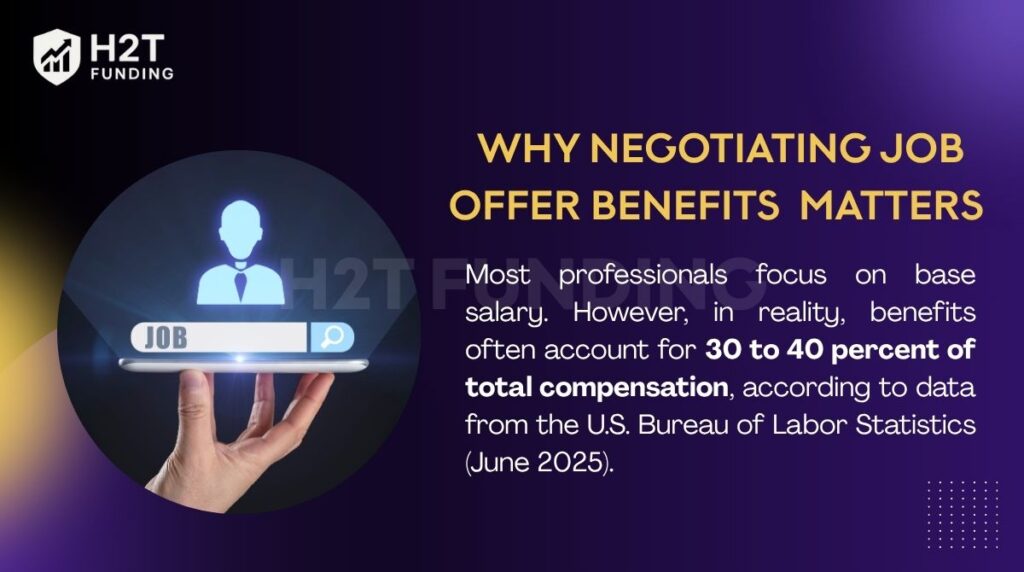
Learning to negotiate job offer benefits is not just about getting perks. It can:
- Secure your finances for a more confident future.
- Boost your job satisfaction
- Help you balance life and work
- Show you understand your worth
Negotiating benefits isn’t just about perks. It’s about designing a career and lifestyle that fit your needs, explains Angela Copeland, career coach and founder of Copeland Coaching.
Also, most employers expect candidates to negotiate salary. It’s a sign of professionalism, not greed. When you ask clearly and respectfully, it positions you as confident and prepared, especially if you know your market rate and a realistic negotiation range.
2. Prepare before you negotiate
Before discussing how to negotiate benefits during the hiring process, you need a solid plan.
Trust me, I learned this the hard way. Early in my career, I was so focused on the salary that I didn’t research standard benefits. I ended up paying for a key certification out of pocket, only to find out later that most of my colleagues had it covered through tuition support they’d negotiated.

Here’s the simple checklist I follow every time I consider an offer:
- Research company policies and industry standards
- Understand my market rate and total compensation
- Define my top priorities clearly before negotiation, and bargaining power
Pro tip: Preparing for a job offer is just like preparing your finances; you’ll be more confident if you already know the numbers. Resources such as the 50/30/20 budget rule, the zero-based budgeting method, and common budgeting mistakes to avoid can help you build that mindset.
2.1. Research company policies and industry standards
Benefits can vary widely from one employer to another. Some are generous with time off, while others focus on health or learning perks. You need to know what’s normal before asking for more.
Where to research:
- Glassdoor, Levels.fyi, Comparably, TeamBlind
- LinkedIn posts from employees or former team members
- Online communities (e.g., Reddit’s r/jobs or r/careerguidance)
What to look for:
- Standard benefits for your role and level (from entry to mid-level to executive positions)
- What similar companies offer in your industry
- Clues about how flexible the company might be
Example: You’re applying to a fintech company in Austin. Reviews say most employees get 18 days of paid time off and hybrid work (3 days in-office). That gives you a benchmark for your request.
2.2. Understand your value and compensation expectations
Look beyond salary when evaluating offers. You need to understand your total compensation, which may include:
- Base salary
- Bonuses or commissions
- Stock options or equity
- Retirement contributions (e.g., 401(k) match)
- Health and wellness benefits
- Reimbursements and stipends
Helpful tools:
- Payscale
- Comparably
- Salary.com
Ask yourself:
For someone with my skills and experience, in this city and industry, what’s the typical compensation package?
This approach is backed by hiring experts like Jason Shen. A startup advisor and former Etsy hiring manager, who emphasizes that bringing market data to the table makes a candidate’s case much stronger.
2.3. Define your priorities clearly
You don’t need to ask for everything, just what’s most valuable to you.
Here’s how to figure that out:
- Make a list of 5 to 10 benefits you care about
- Rank them by how much they impact your life
- Choose your top 2 or 3 to bring up in negotiation
Example priorities:
- More paid vacation
- Flexible work schedule/ telecommuting
- Higher 401(k) match
- Signing bonus
- Learning budget or tuition support
- Childcare or family benefits
How to phrase it: I’m really excited about the role. Flexibility is important to me, especially with family commitments, so I’d love to discuss hybrid work options. I’d also appreciate any support for professional development.
See more related articles:
3. 16 top job offer benefits you can (and should) negotiate
Whether you’re new to the workforce or an experienced professional, knowing how to negotiate benefits in a job offer gives you an edge. It helps you compare multiple offers more effectively or level up your current compensation.
Quick list of benefits you can negotiate besides salary:
- Paid time off (PTO) and vacation days
- Flexible or remote work arrangements
- Signing and performance bonuses
- Relocation expenses and moving costs
- Health, dental, and wellness benefits
- Retirement contributions and 401(k) matching
- Childcare and family support
- Tuition reimbursement or professional development funding
- Better job title or defined promotion track
- Stock options or equity packages
- Expense reimbursements (commuting, home office setup, tech)
- Work phone, laptop, or upgraded equipment
- Flexible start date for smoother transitions
- Extra perks: gym memberships, wellness stipends, travel benefits
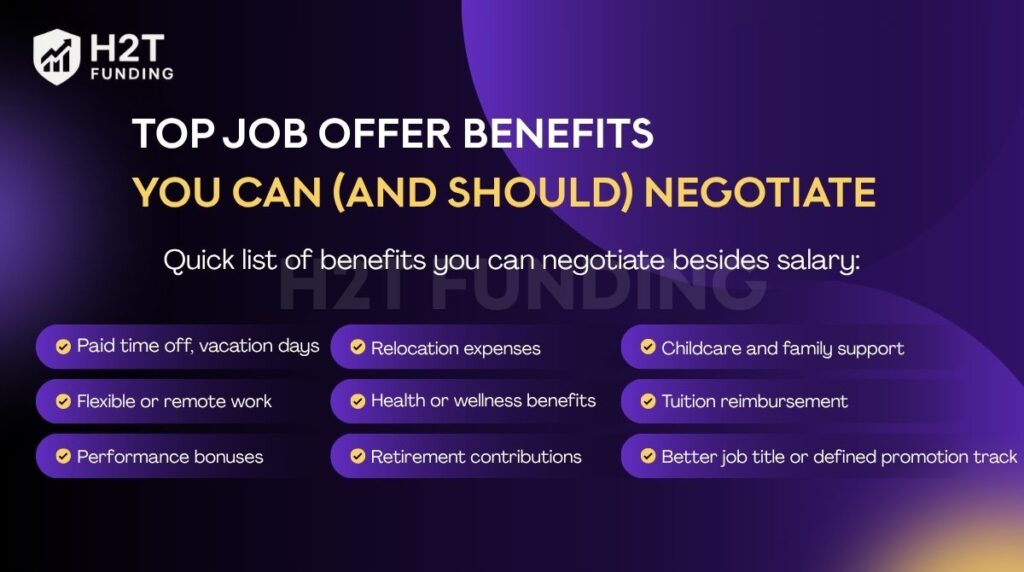
Consider these negotiations as part of a comprehensive financial plan. Now, let’s dive into each benefit in detail and see how you can phrase your ask with confidence.
3.1. Paid time off (PTO) and vacation days
More time off can improve your work-life balance and overall satisfaction. While many companies offer a standard amount, they are often open to adjustments.
Why negotiate this:
- Easier for employers to offer than higher pay
- Supports rest, mental health, and personal commitments
- Especially useful if you’re coming from a company with generous PTO
This aligns with advice from career experts like Liz Ryan, CEO of Human Workplace, who often points out that offering extra PTO can be an easy “yes” for hiring managers.
3.2. Flexible or remote work options
More people are putting flexibility at the top of their list. Even roles described as on-site may allow:
- Hybrid schedules (such as remote Mondays and Fridays)
- Flexible start and end times
- Some companies offer full remote work based on your location.
Real example: A project manager negotiated a hybrid schedule that allowed her to work from home two days per week, despite the job being listed as in-office.
3.3. Signing bonus
Signing bonuses help bridge gaps if you’re leaving behind unvested bonuses or equity.
Common reasons to ask:
- You’re walking away from a performance bonus
- You are relocating or taking on a pay cut for growth
- You need help with transition costs
How to phrase it: I’m very excited about this opportunity. Since I’m leaving a quarterly bonus behind, would a signing bonus be possible to help offset that loss?
3.4. Relocation assistance
Moving for a job is expensive. You may be surprised by what companies are ready to assist with:
- Moving company fees
- Temporary housing
- Flights or gas reimbursement
- Real estate assistance (in rare cases)
Tip: Confirm whether payments are upfront or reimbursements. Get terms in writing, and ask whether a severance package is standard for senior roles that relocate.
3.5. Health, dental, and wellness benefits
Not all insurance plans are created equal. Look into:
- Monthly premiums and deductibles
- What the plan covers (mental health, vision, dependents)
- Whether the employer can contribute more to the premium coverage
- Stipends for wellness apps or gym memberships
Personal tip: One candidate negotiated six months of fully covered health insurance until their spouse’s plan kicked in.
3.6. Retirement contributions or matching
401(k) plans can significantly impact your long-term financial goals.
What to look for:
- Employer matching percentages (e.g., 3 percent or more)
- Immediate vesting (you own the match right away)
- Access to financial planning services and a clear performance review cadence tied to raises
Sample ask: Is there any room to improve the 401(k) match or accelerate vesting based on experience?
3.7. Childcare or family support benefits
If you are a parent or caregiver, these benefits can be game-changers.
Examples of negotiable family support:
- Monthly child care stipends
- Backup daycare services
- Dependent care flexible spending accounts
- Family leave beyond federal standards
Real example: A candidate negotiated a $300 monthly childcare reimbursement for the first six months of their role.
3.8. Tuition reimbursement or professional development
Growth-minded professionals often benefit from:
- Annual learning budgets ($1,000–$5,000 typical)
- Access to paid conferences or courses
- Funding for certifications or degrees
Investing in education is not only valuable for your career growth but also strengthens the organization you work for. Think of it the same way you’d approach budgeting strategies for businesses: careful allocation of resources today creates long-term returns tomorrow.
How to ask: To perform well in this role, I’m planning to earn a project management certification. Is there a budget available for learning and development?
3.9. Better job title or promotion timeline
Your job title affects how you’re perceived inside and outside the company.
Negotiation options:
- A more senior title that reflects your scope of responsibility
- Defined timeline for a title or compensation review (e.g., six months)
- Clear promotion criteria and benchmarks
Caution: Avoid requesting inflated titles unless your scope supports it. This can backfire long-term.
3.10. Stock options or equity
Equity is especially relevant in startups or companies with growth potential.
What to clarify:
- Number of shares or options
- Vesting period (typically four years)
- Any flexibility in increasing your initial grant
- Liquidity or exit plans
Suggested phrasing: Given my experience, I’d like to know if there’s room to adjust the equity package.
3.11. Expense reimbursement
Some roles involve out-of-pocket costs that can be reimbursed:
- Monthly phone or internet bills
- Travel and parking expenses
- Home office setup (desk, monitor, chair)
What to ask: Will the company reimburse for phone and home internet, especially since the role involves remote work?
3.12. Company-provided equipment and technology
Having the right tools from day one can set you up for success. Depending on your role, you may be able to negotiate:
- A dedicated work laptop with updated software
- A smartphone with a business plan for calls and data
- Ergonomic furniture or accessories for your home office setup
Smart asks: Since this role involves frequent remote collaboration, would the company be able to provide a laptop and headset to ensure reliable performance?
3.13. Negotiating your start date
Not every professional is ready to jump into a new job immediately. A flexible start date gives you time to:
- Finish responsibilities at your current role
- Take a short personal break to reset before starting
- Manage relocation, family, or other obligations smoothly
Example request: I’d love to join the team and give my best. Would starting one month later work, so I can complete my transition responsibly?
3.14. Performance-based bonuses
Beyond a signing bonus, some companies reward consistent contributions. Negotiating a structured bonus plan can bring you:
- Additional earnings tied directly to results
- Clear performance benchmarks that align with career growth
- Motivation to exceed expectations while adding value to the company
Tip: Ask about quarterly or project-based incentives rather than only annual bonuses, which can feel too far off.
3.15. Commuting and travel support
Getting to work isn’t free, and employers know this. If the office location or travel is demanding, ask about:
- Monthly public transit passes
- Parking reimbursements or designated spaces
- Support for business travel, mileage, or even a company car for client visits
Why it matters: These small perks can save hundreds each month and improve your day-to-day routine, prime examples of negotiating benefits for a new job
3.16. Wellness and lifestyle perks
Today’s workplaces increasingly invest in employee well-being. You may be able to secure perks such as:
- Subsidized gym memberships or fitness stipends
- On-site wellness programs, from yoga to meditation sessions
- Healthy meal or snack options provided during the workweek
Positioning strategy: Frame wellness perks as a way to maintain productivity and reduce burnout, not just personal benefits.
These additional perks might seem secondary, but they add up to major improvements in quality of life. The key is identifying which ones align with your priorities and confidently bringing them up in your negotiating benefits job offer conversations.
4. How to ask: Proven negotiation tips from career experts
Now that you know what to ask for, let’s talk about how to negotiate benefits in a job offer effectively.
Benefits negotiation is not about being pushy or demanding. It’s about communicating your value and needs clearly and respectfully. Here’s the polished way to go about it.
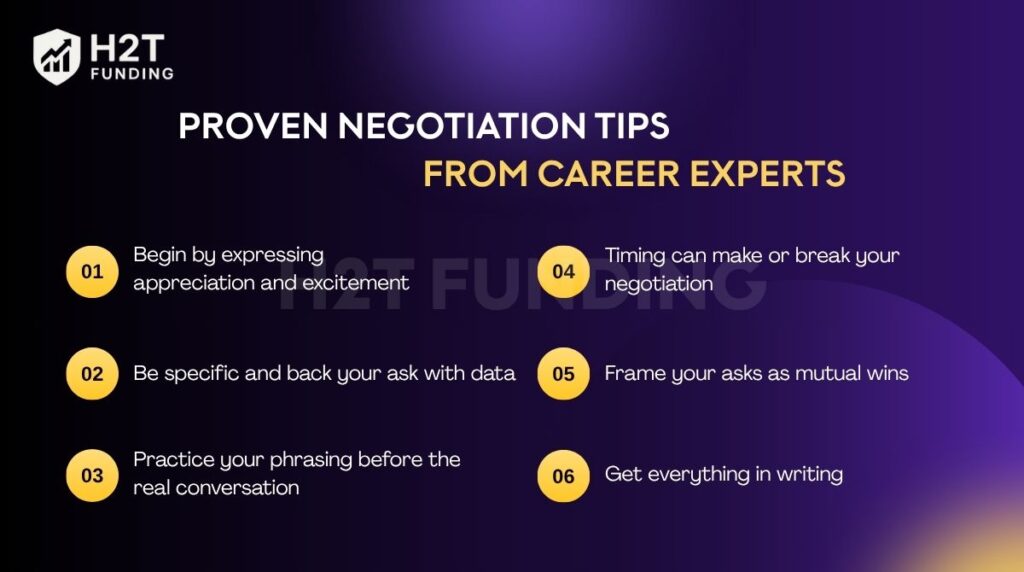
4.1. Begin by expressing appreciation and excitement
It’s best to open with genuine thanks. Show them you’re thrilled about the role. This sets a collaborative tone and keeps the conversation positive.
What to say: Thanks so much for this opportunity. I’m really excited about this role and joining your team.
Why it works: It shows professionalism and reduces defensiveness from the other side.
4.2. Be specific and back your ask with data
Vague requests don’t go far. Be direct and explain exactly what you’re asking for and why it matters, especially if you want to negotiate benefits after a job offer.
Examples:
- I’d like to request an increase from 15 to 20 days of PTO, which aligns with what I’ve seen in similar roles in this industry.
- Based on my research and prior experience, I believe a signing bonus of $5,000 would fairly reflect the transition I’m making.
Tips:
- Reference market data or personal circumstances
- Avoid emotional justifications like I just feel I deserve more.
4.3. Practice your phrasing before the real conversation
Rehearsing helps you sound more confident and less reactive.
Keep your tone calm, courteous, and clear, like:
- Would there be flexibility around…
- Could we explore adjustments to…
- I’d like to better understand if there’s room to improve…
Avoid:
- I need or I demand
- Avoid wording that feels demanding or rigid.
Recruiter-approved tip: Soft openers work best. It’s not about bulldozing. It’s about inviting a discussion, says Megan McCann, tech recruiter and CEO of McCann Partners.
My experience:
Before my first successful negotiation, I rehearsed with a friend who works in HR. Practicing lines like Would there be flexibility around… helped me stay calm and confident.
If you’re nervous, try recording yourself.
This builds fluency so you can negotiate benefits after a job offer without hesitation.
4.4. Timing can make or break your negotiation
Timing matters. The best moment is after the offer but before you sign. If you’re considering how to negotiate benefits during the hiring process, remember that timing is critical and should align with when the employer is ready to discuss compensation. Never bring up benefits during early interviews.
Best time windows:
- Once you have the offer in writing, it’s time to talk about the details
- After verbally expressing interest, but before accepting
- When asked directly: Do you have any questions about the offer?
Avoid negotiating:
- During a group interview or panel
- Before you’ve proven your fit for the role
4.5. Frame your asks as mutual wins
Make it clear how your request benefits both sides. You’re not asking for favors, you’re setting yourself up to perform at your best.
Examples:
- With extra PTO, I can stay refreshed and focused, which supports long-term productivity.
- A flexible work schedule helps me maintain high energy, which directly improves client service.
Golden rule: Show that what helps you will also help them.
4.6. Get everything in writing
Verbal agreements don’t count until they’re in the offer letter.
Before you sign:
- Double-check that your negotiated benefits are listed
- Ask for an updated offer if anything changes
- Keep email records of all negotiation conversations
Pro move: If a recruiter promises something, ask politely: Can we include that in the final offer document just to make sure we’re aligned? Advice from Kate Dixon, executive compensation coach.
5. Common mistakes to avoid when negotiating benefits
Even strong candidates can lose leverage by making avoidable errors. Mastering negotiating job benefits helps you secure both salary and perks.
It’s an easy mistake to make. I’ve been there. With my first real job offer, I was so focused on the salary that I didn’t look closely at the benefits package. A year later, after some unexpected medical bills, I realized just how much that oversight had cost me.
Now, I’ll share what I’ve learned and some mistakes I’ve picked up from others so you can negotiate benefits smartly.
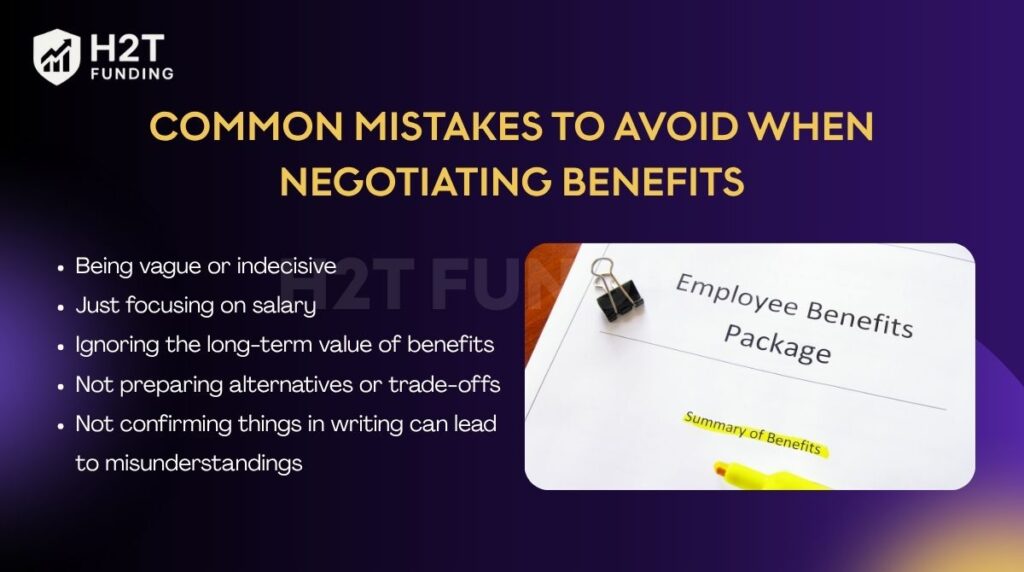
5.1. Being vague or indecisive
If you don’t know what you want, the company won’t either.
Instead of saying: Is there anything else you can offer?
Try: Would it be possible to add a professional development budget of $2,000 annually?
5.2. Focusing only on salary
Salary is important, but other benefits may have a long-term impact. Identifying the benefits to negotiate other than salary ensures you don’t overlook valuable perks like PTO, flexibility, or professional development support.
What you might overlook:
- 401(k) matching
- Health insurance tier upgrades
- Extra PTO or hybrid work options
- Equity in high-growth companies
Just like choosing the right budgeting apps for 2026 helps you balance priorities beyond income alone. Looking at the full benefits package ensures your financial and personal goals are aligned.
5.3. Ignoring the long-term value of benefits
Short-term perks can feel great, but long-term benefits like retirement contributions or a severance package can offer real security across roles and new job benefits negotiation cycles.
Think beyond your first year:
- Will this help you grow?
- Can you maintain a work-life balance over time?
- Are you financially protected if things change?
5.4. Not preparing alternatives or trade-offs
Sometimes a company can’t meet your first request, but they might offer something else. Be ready to pivot.
Example trade-offs:
- If they can’t raise the salary, ask for a signing bonus
- If more PTO isn’t possible, ask for a remote schedule
- If equity is fixed, ask for an earlier promotion review
5.5. Not confirming things in writing can lead to misunderstandings
Never rely on memory or verbal promises. If you agree on new terms, ask for confirmation in writing before signing.
How to follow up: Thank you for agreeing to include a $3,000 signing bonus. Could you please confirm that the revised offer will include this?
6. Sample email templates to negotiate job offer benefits
Use these templates as starting points and adjust them to fit your situation. I’ve used these myself when I negotiate benefits after job offer discussions, and they worked well.
They’ll give you a confident, clear way to communicate exactly how to negotiate benefits in a job offer by email, whether you’re asking for PTO, a bonus, or relocation help. These examples also show how to respond to a job offer, negotiating benefits and job offer terms professionally and persuasively.
1. Template: Requesting more PTO
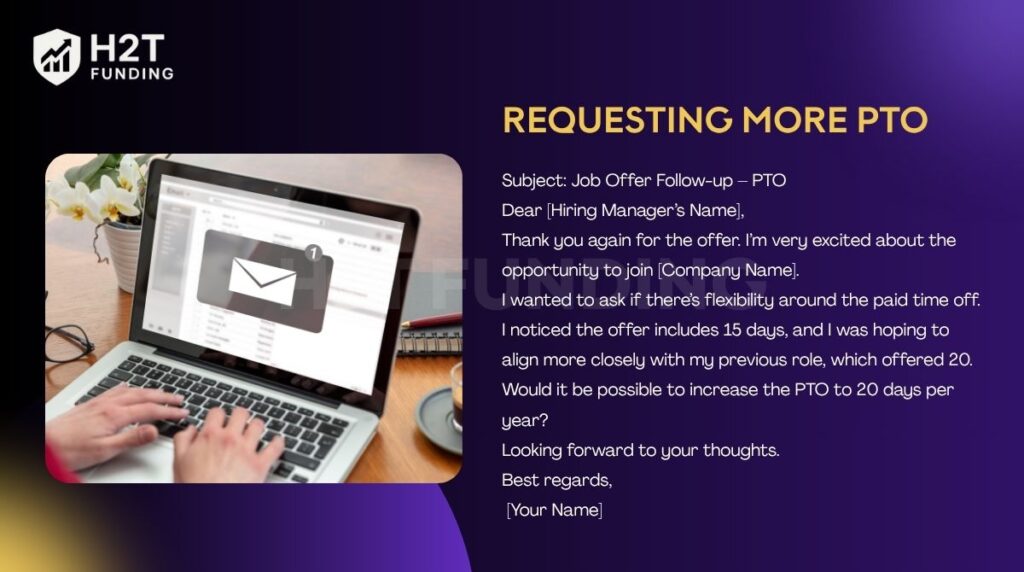
2. Template: Asking for relocation or sign-on bonus
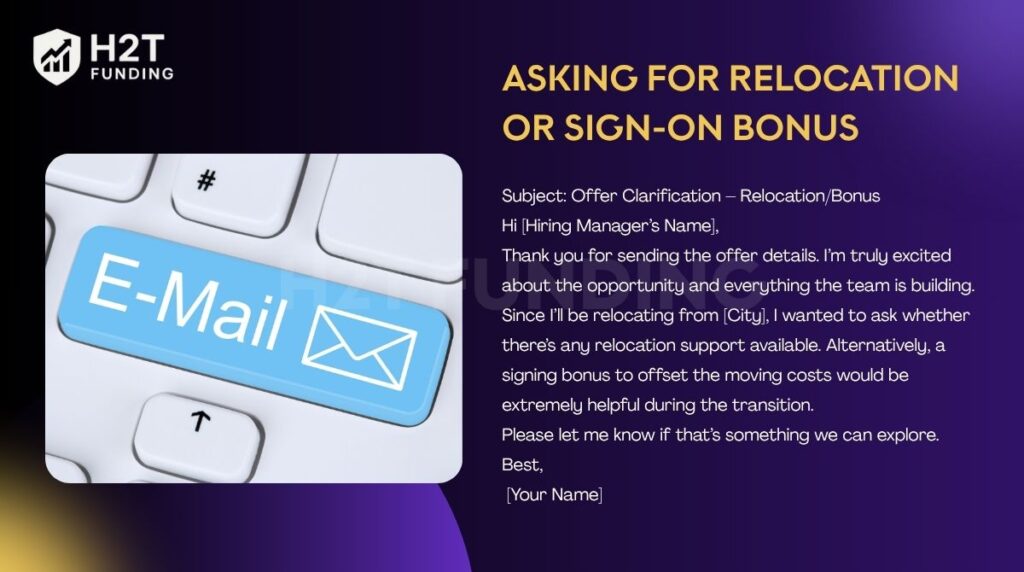
3. Template: Counter-offer combining salary and benefits

7. FAQs
Yes. Benefits often affect your lifestyle more than a small salary increase. More PTO, flexible hours, or better health coverage can be worth thousands annually.
Many candidates wonder, “Can you lose a job offer by negotiating salary?” The truth is, it’s rare that you handle the conversation professionally.
Right after you receive the offer, but before you sign. That’s the best time to make your case.
Yes, though there may be less flexibility. Focus on things like training opportunities, mentorship, or flexible hours.
It’s okay to walk away if the package doesn’t meet your needs. If the company won’t budge, that may reflect how they’ll treat you long-term.
Yes. Negotiating shows you value your skills and understand your worth. Most companies expect some level of discussion, and you may gain benefits or pay that would otherwise be left on the table.
Research what’s standard in your industry, then prioritize the perks that matter most. Be specific and respectful when making requests, and explain how the benefits will help you succeed in the role.
It depends on the market and your experience. In high-demand fields, 20% may be reasonable, but in other cases, it could be risky. Support your request with salary data and stay open to compromise.
Better pay, stronger employee benefits, and improved work-life balance, plus a clearer path to growth through structured reviews and raises.
8. Conclusion
To negotiate job offer benefits successfully, you need more than confidence; you need a strategy.
From extra vacation time to better insurance or work flexibility, the right benefits can greatly improve your job satisfaction and career growth.
Be prepared, be specific, and communicate professionally.
Most importantly, remember: you’re not asking for favors. You’re standing up for your long-term goals.
For a deeper dive into proven strategies, visit our Strategy Section and Budgeting Strategies, or explore more resources on the H2T Funding.





